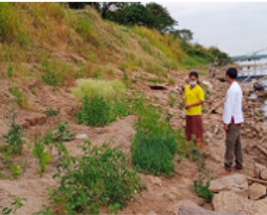
Learning from communities along the EWEC
Acerca de
Thailand-Laos border crossing

About
Reality of the EWEC development and COVID-19 pandemic
Development of the corridor provides opportunities for some people. All targeted border communities reported positive economic impacts including non-farm employment and new business opportunities (hotels/restaurants/taxi/casino). Laos/Thai border communities identified some negative impacts: loss of land, less solidarity and drug addiction. Negative impacts due to the pandemic were reported by the communities: loss of income from: trade, fishing, sand mining, tourists, and daily agricultural labour; prohibition of visiting relatives and going to school and cancellation of festivals; and new social crimes such as stealing of a donation box from a temple.
Realization of the cross-border issues
Lao communities raised these issues: loss of income from selling fish/goods, increased price of animal feed, limitation of rainfed rice production. Mukdahan/Thailand communities raised these issues: less variety of fish, limited variety of organic vegetables they grow, and lost income from tourism.
Suggested solutions
Possible solutions were suggested by local people: set-up community market to sell their products, domesticate fish, find suitable organic vegetable variety to grow, increase agricultural labour through cross-border network development, setup community museum to show cultural ties of Lao and Thai people.

Organic vegetable types are limited to grow in cool season (Mukdahan, Thailand)


Variety of fish from Mekong river decreased in both Thai-Laos border communities



